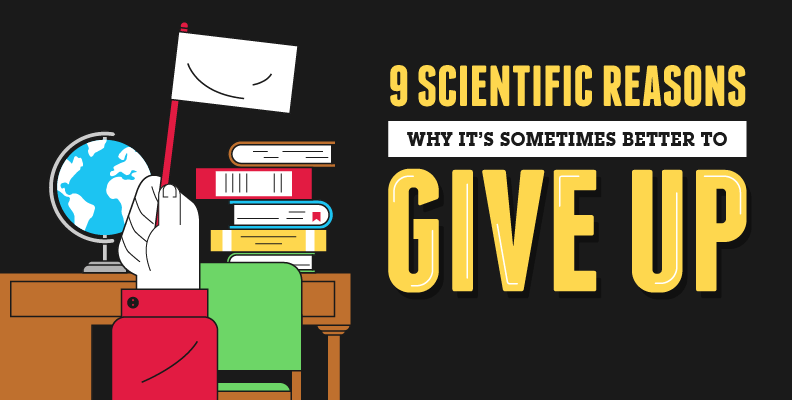Walking away from something we’ve committed to can be difficult. Researchers believe that one of the primary reasons for this is the sense of loss we experience when abandoning something we’ve invested time and effort into. This is, of course, amplified by the fact that work ethic is ingrained in our society. The importance of persistent hard work is emphasized as one of the greatest virtues that anyone can possess.
But a growing body of research suggests that persistence has its downsides, too. A laser-like focus on one goal (like a promotion) often prevents us from seeking out new opportunities for learning and growth. In fact, a survey of Stanford Business school alumni found that those who held five or more positions in 15 years were nine times more likely to reach senior management than those with fewer roles.
The effects are physical, too. A Concordia University found that teenage girls who were unable to disengage from difficult goals exhibited increased levels of C-reactive protein, an inflammatory molecule linked to diabetes, heart disease and early aging in adults.
So what should we do? According to psychologist Susan David, the most agile and adaptive response to an unattainable goal is goal adjustment. Recalibrate by disengaging from the difficult goal and re-engaging yourself in an alternative.
Research shows that disengagement actually has positive effects on the body, including fewer illness symptoms like headaches, eczema and constipation. It also promotes better sleep, which researchers believe is due to the reduction in stress.
Knowing when to walk away from something that’s no longer serving you is an important trait – it’s the mark of someone who knows where to focus their time and energy. Here’s a raft of reasons and research demonstrating that giving up isn’t always the senseless act of defeatism it may appear to be.

Sources
Ruggeri, A. (2017) Why we should all give up on goals already. bbc.com
Freund, A., Hennecke, M. (2011) Changing eating behaviour vs. losing weight: The role of goal focus for weight loss in overweight women. In Psychology & Health, 27(2), pp. 25-42
Wrosch, C., Scheier, M. and Miller, G. (2013) Goal Adjustment Capacities, Subjective Well-Being, and Physical Health. In Social & Personality Psychology Compass, 7(12), pp. 847-860
Lee, L. (2010) Don’t Be Too Specialized If You Want a Top Level Management Job. gsb.stanford.edu
Soman, D., Cheema, A. (2014) When Goals Are Counterproductive: The Effects of Violation of a Behavioral Goal on. Subsequent Performance. In Journal of Consumer Research, 31(1), pp. 52-62
Feldman, D., Ph.D. (2017) Why Giving Up Can Sometimes Be Good. psychologytoday.com
Welsh, D. and Ordóñez, L. (2014) The dark side of consecutive high performance goals: Linking goal setting, depletion, and unethical behavior. In Organizational Behavior and Human Decision Processes, 123(2), pp. 79-89
Risen, C. (2007) Quitting Can Be Good for You. nytimes.com
David, S. (2017) Knowing when to quit is as important as having grit. quartz.com
Embed This Image On Your Site (copy code below):






